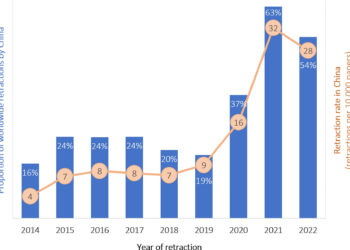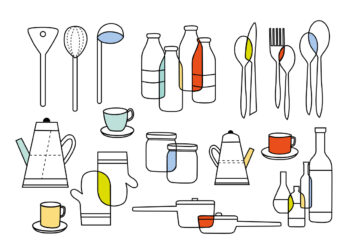
- Image via Wikipedia
Informal peer-to-peer sharing of scientific articles is common for researchers in developing countries, a new study suggests.
The article, “Access to scientific literature in India,” appears in the December issue of the Journal of the American Society for Information Science & Technology. Its author, Patrick Gaulé, is a post-doctoral student at the MIT Sloan School of Management. An earlier draft of his manuscript is freely available.
Reporting on several related research studies, Gaulé combines a massive bibliometric citation analysis with a survey of Indian researchers on their article sharing behaviors.
Analyzing 1.27 million citations to over 45,000 articles published in 2007, Gaulé compared the citation behavior of Indian researchers with those of Swiss researchers. On average, the reference lists of Indian papers were 6% shorter than their Swiss counterparts when published in the same journal. This translates to about two fewer citations. The reference length effect was more exaggerated in the life sciences (9% decrease for biology, 11% for medicine) than for physics, engineering, or chemistry.
In addition, Indian researchers included about 50% more citations to open access journals than Swiss researchers, although this translated to just a small fraction (0.16) of one citation.
In a similar study published earlier this year, Tove Frandsen reported that authors in developing countries were no more likely to cite open access journals, although her limited sample size (150 biology journals) did not permit her to detect small differences in her data. Evans and Reimer’s 2009 paper in Science analyzed 26 million articles appearing in over 8,000 journals and thus was able to detect small but statistically significant differences.
Gaulé is cautious when attempting to interpret the differences in reference length as many citations listed in a paper are perfunctory — that is, they are not necessary to understand the meaning of paper but appear to serve to acknowledge that other general work has been done in the field. Many authors understand this form of citation as “hand-waving.”
Assessing whether differences in citing behavior reflect a severe problem is difficult. Do missing references really imply missing knowledge?
Even the best Indian research library has sub-optimal access to the scientific journal literature. The Indian Institute of Science, for example, lacks access to one-third of the top biology journals. Gaulé was interested in how Indian researchers cope with their situation.
The answer? File-sharing.
Indian researchers routinely send requests to corresponding authors and peers for copies of articles, Gaulé reports. Some Indian researchers responded that they obtained articles from former students now doing research in the United States and Europe. Most requests for copies were honored, and the strong sharing ethos in science may help attenuate the effects of subscription access barriers. Gaulé writes:
Thus, in practice, the importance of openness as a norm of science lessens the effect of restrictions imposed by publishers on access to the literature. It could be that the prevalence of informal information sharing is increasing over time, thanks to the generalization of new technologies facilitating information exchanges
Still, having to rely on authors and peers to supply one’s information needs may not be an optimal way to conduct science. Programs like HINARI, AGORA, and OARE may help alleviate access problems in some of the world’s poorest nations, although countries like India fall above the cut-off for eligibility. Gaulé concludes:
In the long run, having all scientific publications freely available to the world from the day of publication may be a desirable goal. In the short run, however, it is more important to make scientific publications freely available for developing countries because this is where the problem really lies.
Discussion
9 Thoughts on "No Journal Access? Email the Author, Colleague"
It would be interesting to see this same study replicated between US research libraries and smaller US college/university libraries (e.g. ARL vs non-ARL) to see if the same effect is visible.
P2P article sharing has been the norm for decades – recall the pre-internet reprint exchange system. I don’t imagine US scientists are very shy about asking their colleagues for PDFs of articles whenever the need arises. If you know your colleague is in town, it’s gotta be faster than ILL.
There is a culture of sharing in academe that transcends money-grubbing I-subscribe-you-don’t attitudes. And it’s not only the “have nots” doing the asking either. Since no library can have it all, even Harvard’s scholars are probably going to ask for an article now and then.
Yes, sharing is the norm and we should not assume that if a library doesn’t have a subscription its community has no access.
Still, Gaule reports that Indian reference lists are shorter than Swiss lists which tells me that the time and effort that goes into asking authors and colleagues has a real quantifiable effect.
One would expect, however, that this citation effect would be diminishing over time as the sharing becomes easier and faster.
At least publishers, to their credit, seem to acknowledge the fact of informal P2P sharing and facilitate the emailing of articles. They are smart enough to know that attempted interdiction would merely irritate people and make them more determined to evade restrictions.
As a result, we don’t see the kind of domestic piracy culture in journal publishing, at least nothing like what the music and film industries deal with. (Although one hears about serious abuse of licensed access via stolen credentials in some Asian countries, where what we might call theft is viewed more as “creative acquisition” and widely practiced. That’s very different from polite sharing.)
I’m a developing country researcher (from South Africa) and, yes, I too get papers from authors or friends at better-resourced universities. I generally do a bunch of web searches, if I then can’t get it, I email the author(s), and if that doesn’t work, I ask a friend at MIT, Oxford or Edinburgh.
For a while my university didn’t even have access to Science or Nature… so I relied heavily on such strategies.
BETTER: SELF-ARCHIVE AND RELY ON THE EMAIL-EPRINT-REQUEST BUTTON DURING ANY OPEN-ACCESS EMBARGO
http://openaccess.eprints.org/index.php?/archives/274-guid.html
Life is short, and can be reckoned in terms of keystrokes.
One deposit in your institutional repository is a few keystrokes.
For 63% of articles, one more keystroke makes your deposit Open Access (OA), with the publisher’s blessing, and users need nearly click once to access.
http://romeo.eprints.org/stats.php
For the remaining 37%, set access as “Closed Access” (one keystroke), and the Button will provide “Almost-OA” semi-automatically during the embargo: A few keystrokes for the user and one keystroke for the author.
And once 63% is OA and 37% is almost-OA, the embargo dominoes will soon fall under author/user pressure for more OA, and 100% will be accessible via OA (one keystroke)
Thanks Phil. This is all to be expected.
We still hear from librarians that they build their journal collection based on researcher need & that researcher recommendation is a key factor in decision-making for new purchase and cancellation. I suspect this recommendation system may be less than robust in many instituions. When I ask a librarian when they last saw a request they find it hard to remember.
And when you reveiew usage of the “chosen” journals, you get a sense of how hard it is to predict all needs.
It would be great to get a sense of the scale of P2P sharing in well-resourced universities and how likely it is that a user alerts their library to their journal needs when getting hold of what you want quickly and easily via sharing is the reality. And when the libarry is making cuts.
We should not stop sharing, but we could be more knowledgable about the mechanics of title selection and how it can be improved if we dig a bit deeper.
Good points, Bernie!
The very nature of the informal sharing of documents between authors and readers makes it difficult to capture this information, although it would be immensely helpful to know how much patrons bypass their library to procure information.
An anonymous large-scale survey with a few choice questions may be worth doing though. I’ve heard anecdotally it’s easy to get what you need if you have no access. That was from someone at Oxford and accompanied the words “I would never pay and can always get what I need from someone”.
![Reblog this post [with Zemanta]](http://img.zemanta.com/reblog_e.png?x-id=c35f4a3b-b543-4600-962a-495a61835e8e)


